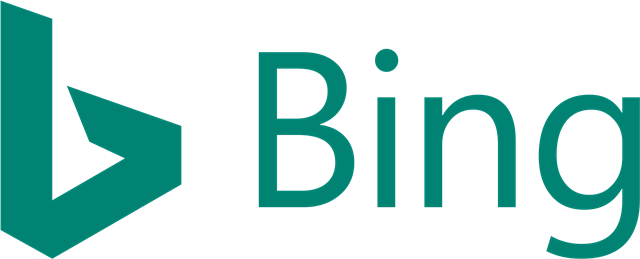
Image Source: Wikimedia Commons
Marketers, PR and SEO experts generally view Google as synonymous with “search engine.” When they talk about optimizing content or websites for search engines, they usually mean optimizing for Google. It’s true that Google dominates web searches. But PR, marketing and SEO personnel ignore Bing at their own risk.
Bing controls 36% of the US desktop search market, and 66 million Americans rely exclusively on Bing, while 62 million use both Google and Bing, depending on the device and type of search, says Mark Irvine at WordStream, citing ComScore data.
Many people don’t realize they’re using Bing. It’s the default search engine for search bars at the bottom of Windows computers, Cortana searches and Microsoft’s Edge and Internet Explorer. Bing also powers searches initiated on Microsoft Office programs, and Amazon’s Alexa. Microsoft also partners with smaller search engines such as Yahoo, AOL and DuckDuckGo.
Because many people search first on Bing before searching on Google, brands that advertise on Bing gain higher click-through rates for their websites on Google due to better brand recognition, Irvine says.
It follows that strong organic rankings on Bing may also produce better results on Google.
Bing attracts different demographics than Google, which should interest certain brands. Bing users are slightly older, more educated, more affluent and more likely to be married and have children.
Bing is surprisingly popular in certain verticals. It boasts 44% of all business and finance related paid search clicks, and is similarly strong in automotive (40%), real estate (39%), and travel (37%).
Brands win more conversions on Bing. A well-optimized website has a higher conversion rate on Bing than Google — typically about 20% vs. 16%, says SEO expert Aleh Barysevich, in a MarketingProfs post.
Differences in Bing and Google SEO
Some SEO and marketing folks ignore Bing believing that sites that rank well in Google will also rank well in Bing. But that’s not exactly the case. “Their algorithms are remarkably different. Just compare results for the same term and you will quickly see what I mean,” says SEO expert Matthew Woodward.
Bing SEO is easier. Bing SEO calls for simple keyword matching, optimized anchors, and old-fashioned link building. Bing is also more transparent about its ranking factors. It offers a range of free diagnostics and tools and straightforward guidelines.
First, read the Bing Webmaster Guidelines and the Bing Webmasters Blog, Woodward advices. Also, become familiar Bing Webmaster Tools, including the Bing Website Analyzer which shows if your pages follow Bing SEO best practices. You can contact the Bing webmaster team if your site has problems for any reason. If nothing else, Microsoft is thorough in providing instructions on its software and services.
On-Page SEO
Bing places greater emphasis on on-page SEO factors such as these elements.
Keywords. Bing continues to assign significant weight to keywords. Including keywords in the title (H1), subheadings (H2) and the opening paragraph can boost rankings. Pay attention to keyword density, but beware that overloading keywords could hurt Google rankings, writes Chuck Price, founder of Measurable SEO, in Search Engine Journal.
Bing, like Google, truncates long title tags. Keep titles under 70 characters or at least place your keywords before the cut off.
Meta name descriptions don’t impact rankings, but including the keyword in the meta name description may encourage clicks because Bing will bold the keyword for the user to see.
Unlike Google, Bing takes into account meta keywords but has cautioned that abusing them can hurt your rankings. Don’t bother with them, advises Danny Sullivan at Search Engine Land. Because so many people stuff keywords into the tags, Bing uses them more as a spam signal rather than to rank pages.
Off-Page Ranking Factors for Bing
Backlinks. SEO experts believe that Bing places greater importance on the number of backlinks than Google. “Apparently, growing your link profile in size is a massively effective tactic for Bing. It may not give you the same boost in Google, but it won’t hurt either (provided you remember to avoid spam at all costs and pick relevant sites to build links on),” writes Masha Maksimava of Link-Aassistant.Com.
In-bound anchor text. Bing places more emphasis on the anchor text usage than Google does, Woodward says. If you want to rank for ‘Blue Widgets’ you need links that use ‘Blue Widgets’ as the anchor. “They aren’t as good as Google at keyword matching,” he writes. “While Google does well with recognizing synonyms and context around a keyword, Bing needs spoon-feeding.”
Social signals. While SEO gurus are unsure if Google includes social signals in its ranking factors, they’re certain that Bing does. Bing clearly says that social signals can improve organic rankings. “If you are influential socially, this leads to your followers sharing your information widely, which in turn results in Bing seeing these positive signals,” its guidelines state.
Fresh content. Bing tends to rank pages with up-to-date content. The means updating older articles and content pieces with the latest news, trends and studies, is a healthy practice, says Sheryl Jones, senior marketing specialist at Uplers. Periodic hygiene checks refreshing content will keep your site relevant, and more likely to perform well in Bing search rankings.
Bottom Line: SEO experts advise not to ignore Microsoft’s Bing, which powers significant share of web searches. The good news is that Bing SEO is easier than Google’s and its SEO requirements are more transparent. In addition, traffic from Bing can bring excellent results.
This post was first published on Dec. 7, 2016, and updated on Sept. 16, 2020.
Schedule a Free Online Demo of the Glean.info Media Monitoring & Measurement Dashboard
William J. Comcowich founded and served as CEO of CyberAlert LLC, the predecessor of Glean.info. He is currently serving as Interim CEO and member of the Board of Directors. Glean.info provides customized media monitoring, measurement and analytics solutions across all types of traditional and social media.




